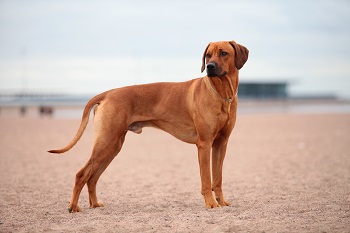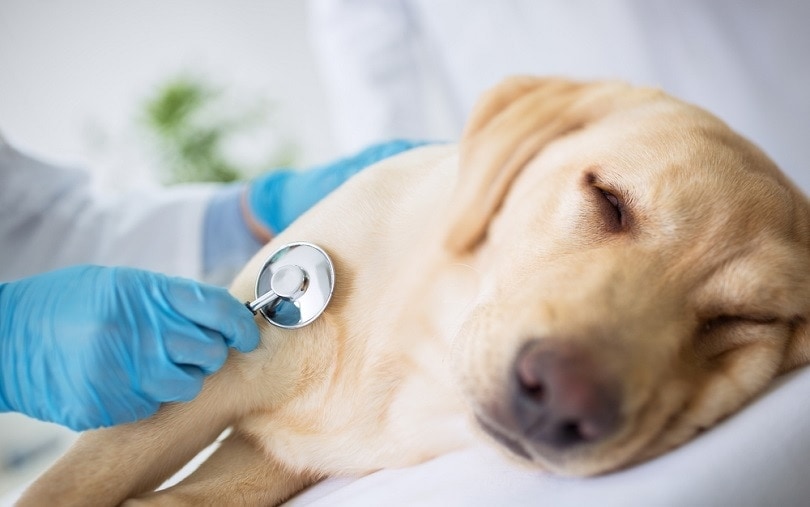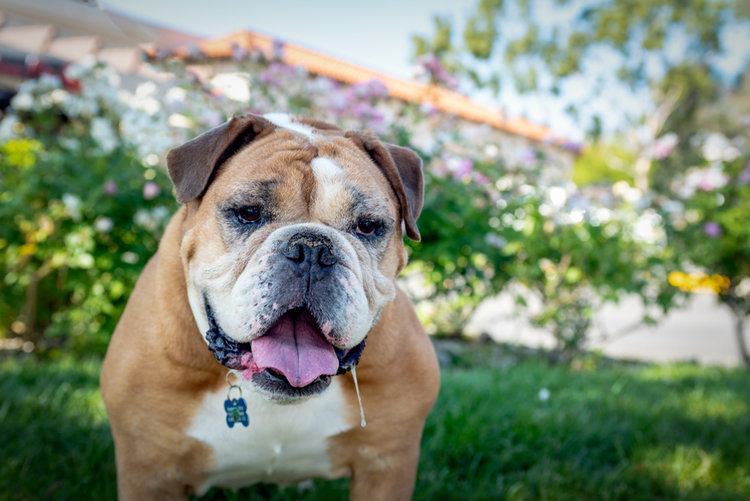Why is My Dog Coughing After Drinking Water? Vet-Approved Facts & Advice

Updated on
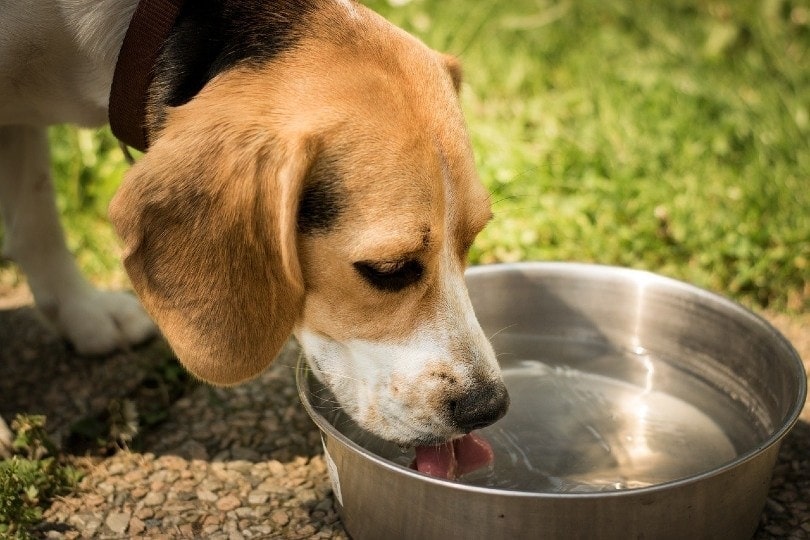
Dogs use their mouths and noses to explore the world. Consequently, they tend to access all kinds of contaminants, including pollen, dust, germs, and bugs.
Cough reflexes in dogs are devised to expel any contaminants they may drink or breathe during their explorations. It comes automatically to maintain a dog’s respiratory tract health and protect the lungs by clearing the foreign particles and irritants from the breathing passage.
For this reason, coughing after gulping down water intensely, more often than not, shouldn’t be worrisome. Your hound has most likely gobbled a mild irritant from the water, triggering the cough reflex.
However, if your dog has been intensely and frequently coughing lately, it should be alarming, especially if it is a puppy or a brachycephalic dog breed.
Meanwhile, it would be best to understand some terms you may meet in this article.
Dog Coughing: Key Terms
- Brachycephalic: These dog breeds are short-muzzled, which means that their snouts are short, making their faces appear flat. They include boxers, French bulldogs, Boston terriers, English bulldogs, bullmastiffs, pugs, and many others.
- Hypoplastic Trachea: This is a medical condition that arises from the trachea or windpipe’s flattening due to incomplete development.
- Tracheal Collapse: This is a medical condition that causes a dog’s windpipe to collapse due to the weakening of the cartilage rings and the trachea’s muscle.
- Reverse Sneezing: This is a respiratory phenomenon in dogs, especially the short-muzzled species, which includes sudden and intense inhalations through the nose after an irritation at the dog’s soft palate. It is also known as backward sneezing.
- Kennel Cough: This is a dry and hoarse cough that sounds like something is stuck in your dog’s throat.
- Cough Suppressant: These are substances or medications that ease or suppress a cough.
Top 5 Reasons Why Dogs Cough After Drinking Water:
1. Water is Blocking the Windpipe
Of course, the first trigger could be something that’s going down the pipe the wrong way. A dog’s throat is quite detailed and complex, thanks to the windpipe or trachea with cartilage rings, connective tissues, and muscles. These features guide a dog’s breathing and feeding activities.
The trachea moves up and down to guide air during inhalation and exhalation when a dog breathes.
On the other hand, when the hound drinks water or eats food, a small flap at the trachea known as the epiglottis opens up to create a passage to the intestinal tract. This small flap helps prevent the ingested water and food from getting into the airway.
However, the water finds the wrong way into the breathing tract if your canine pet gulps water too fast. It may cause the airway muscles to contract, automatically triggering a cough that appears as a gag immediately after the water passes the epiglottis. This event occurs to protect the lungs.
2. Due to Kennel Cough
Kennel cough is a common condition in dogs and another common reason why your dog coughs after drinking water. Kennel cough is also known as canine tracheobronchitis and is a dog’s version of the “common cold.”
A bacterium called Bordetella bronchiseptica and a parainfluenza virus cause this ailment, which is highly infectious. Like other contagious diseases, your dog can catch it by interacting with other kennel dogs or by touching surfaces that an infected pup touched before.
A dog with kennel cough usually has an irritated and inflamed trachea that results in a strange cough that sounds hoarse and dry like a goose’s honk. When the water passes down the throat, it applies pressure on the already-sensitive windpipe causing it to swell.
Typically, dogs do not get coughs after drinking or eating because there’s no inflammation. But since there’s inflammation on the trachea, the pressure leads to a severe coughing fit that worsens as the dog continues to cough, leading to pneumonia, reducing recovery chances, and in some cases, leading to death.
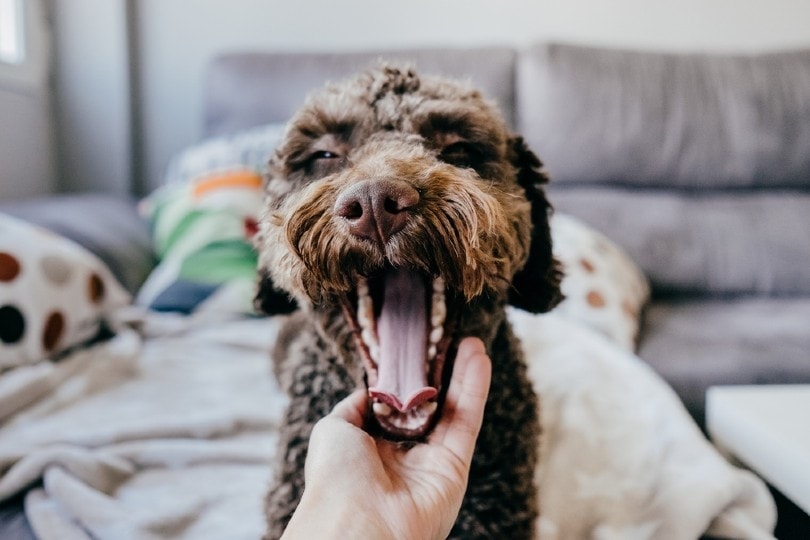
3. Your Dog is Experiencing Hypoplastic Trachea
A hypoplastic trachea is a genetic medical condition dogs are born with, mostly attacking puppies and middle-aged dogs.
A dog with this condition means that its trachea has not developed to the expected full width and size. This body part consists of cartilage rings and muscles responsible for giving the windpipe a distinct shape to allow air, food, and water to pass. However, these rings and muscles develop partially with the hypoplastic trachea, altering the trachea’s shape.
Although it’s a severe medical condition, vets can help manage the condition using treatment options like cough suppressants. This condition is more common in brachycephalic dog breeds—flat-faced breeds like bulldogs and Boston terriers. The shortened length of these dogs’ skulls predisposes them to smaller nostrils and narrow tracheas, restricting the dog’s oxygen inhalation, and triggering a cough in the process.
4. Your Pet’s Trachea is Collapsing
While hypoplastic trachea condition is genetic and due to a malformed trachea, a collapsed trachea affects pups in their middle or old ages. When the windpipe collapses, it can no longer hold its shape, making the cartilage rings and muscles weaken. For this reason, the windpipe can collapse partially or wholly and become narrow and flattened.
Since the trachea has collapsed, the epiglottis, which is the small flap covering the airway, cannot cover the windpipe fully when drinking or eating.
For this reason, water and air struggle to pass through the collapsing trachea, finding their way around the airway and getting into every available gap. It prompts the dog to produce a goose-honking coughing sound in the process.
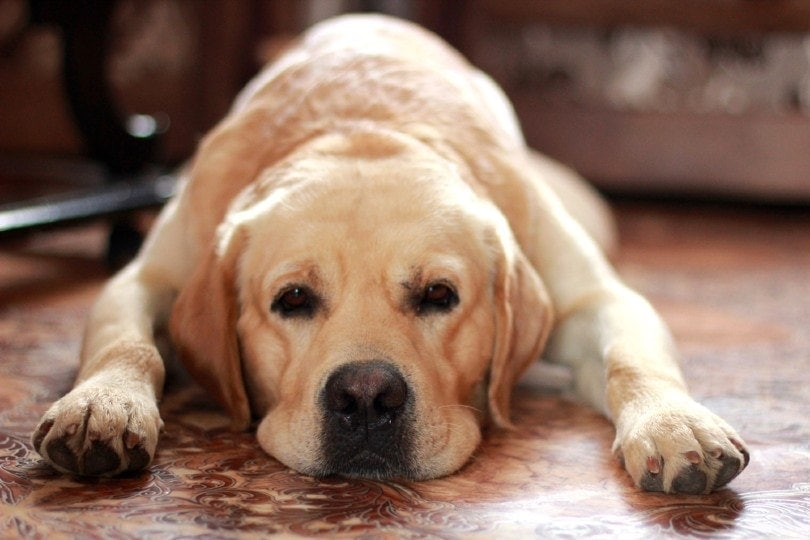
5. Your Dog Could Be Reverse Sneezing
Although reverse sneezing is not a cough, most dog parents confuse it with a cough as it also occurs after the dog drinks water. It’s also common among short-muzzled breeds after they eat and drink rapidly.
The sound the dogs produce is similar to a snorting fit and occurs after the water in the airway causes spasms in the larynx and pushes out air. This condition is typical among all dog breeds too, and it shouldn’t cause any concerns.
However, it would be best not to make this assumption all the time, especially if you have short-muzzled dogs. It could be signaling a respiratory issue like tracheal collapse or a degenerative condition. Consult with your vet for a proper diagnosis if the condition persists.
What You Should Do When Your Dog Coughs After Drinking Water
Train Your Dog
If your dog’s cough after drinking water becomes a frequent thing, it might be necessary to train it on how to go slow on things. This condition is more rampant in overly excited dogs as they tend to gulp water fast and greedily.
Unfortunately, the speed at which the water hits the internal organs can make it go the wrong way, giving rise to intense coughs. It would help get your pup to relax and compose itself before you present it with food or water.
Consult a Vet for the Right Diagnosis
Conditions like kennel coughs result from an infection in the trachea and could lead to pneumonia if you ignore it for too long. You should talk to your vet about this condition, and he may prescribe medication to help resolve it before it turns fatal.
Better still, you can ask your family vet to vaccinate your pup against the Bordetella bacteria to decrease your dog’s chances of catching conditions like the kennel cough.
On the other hand, a veterinary officer can medically treat a collapsed trachea if it is mild or suggests an endoscopy or surgical procedure if it’s severe to strengthen the trachea and improve its stability.
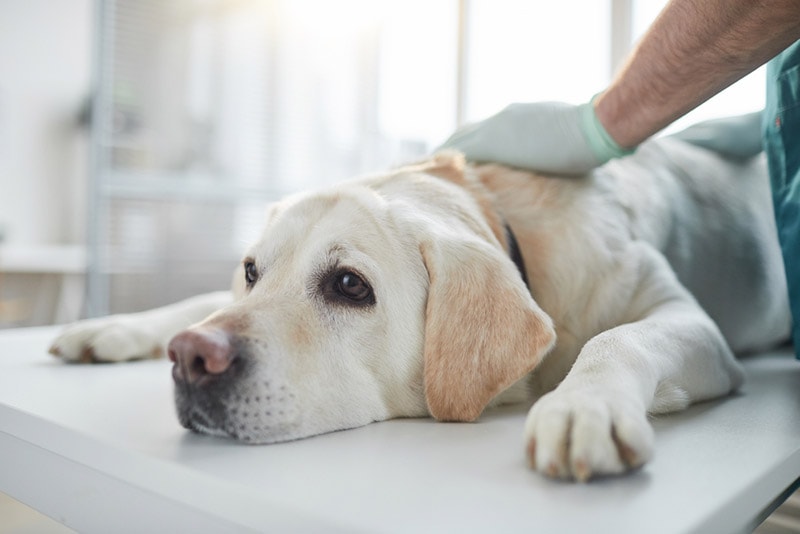
Separate Infected Dogs
Kennel coughs are highly contagious, and your dog may easily catch it from the other dogs it shares a habitat with. It would be best to quarantine affected pups and disinfect their habitats and toys to prevent others from catching the condition.
Summary
If your dog coughs after drinking water, you’ll need a solution. Watching your dog appear to struggle with basic activities like drinking water isn’t easy. If the condition intensifies, seek vet care as soon as possible.
The good thing is cough isn’t a disease but rather a hint that something is wrong. Catching the issues early on is the secret to managing tracheal issues and helping your dog live a happy life and drinking water comfortably.
Check out some of our other top-trending posts:
- Dog Won’t Lay Down? Here’s What It Means and What to Do
- How to Tell If a Dog is Blind – Easy & Helpful Steps
- Ant Bites on Dogs: Signs, Treatment, and Prevention
Featured Image Credit: 584652, Pixabay




